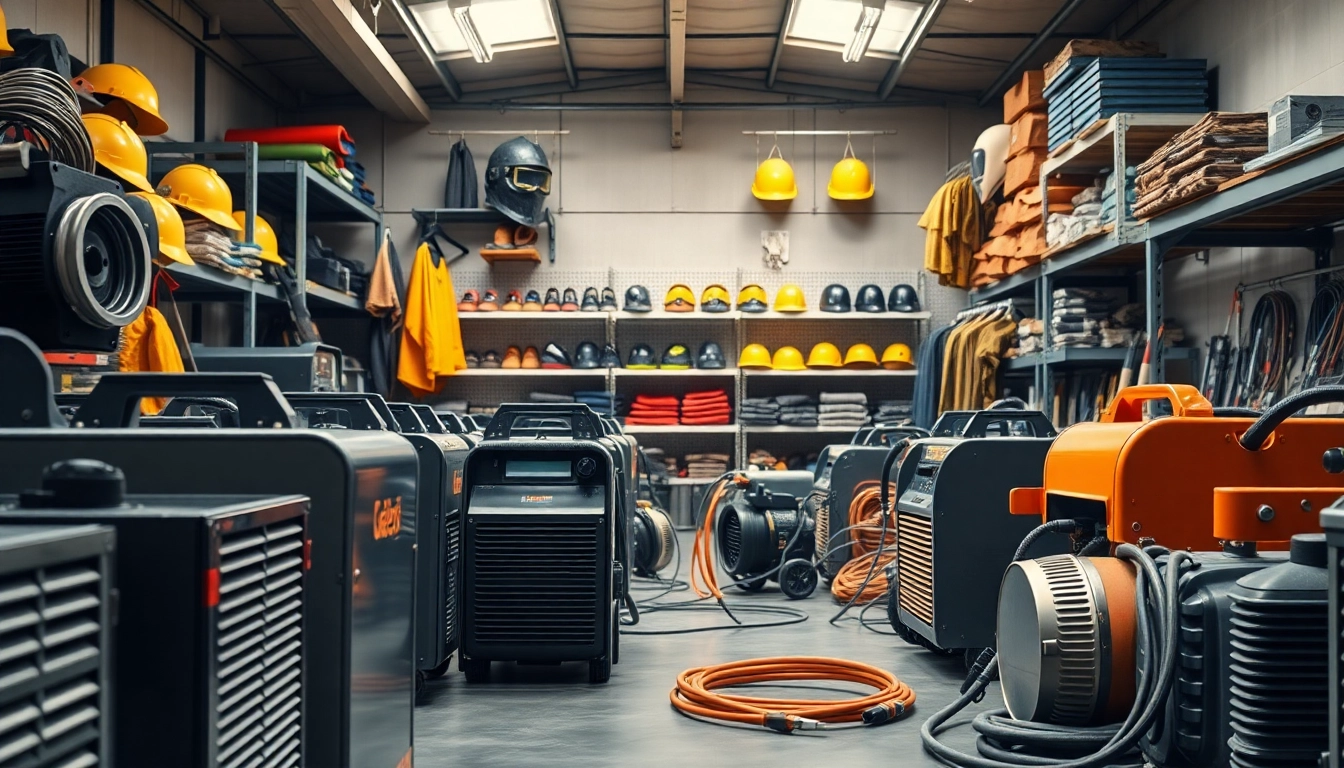Understanding Your Local Welding Supply Options
Finding the right welding supply close to me is essential for individuals and businesses involved in welding projects. The availability of necessary materials and tools directly influences not only the efficiency of work but also the quality of the end product. With multiple suppliers present in various regions, understanding how to navigate local options can save both time and money while ensuring that you have access to high-quality supplies.
Why Proximity Matters for Welding Supplies
Having a reliable welding supply store nearby can significantly impact your operations. Proximity matters for several reasons:
- Immediate Access: Local suppliers permit you to obtain materials quickly. This is particularly vital for urgent projects or repairs.
- Lower Shipping Costs: When sourcing materials locally, shipping costs are minimized, saving you money in the long run.
- On-Site Support: Many suppliers offer technical assistance and advice, which can be invaluable, especially for novice welders.
- Community Engagement: Supporting local businesses strengthens the community and promotes local economies.
Types of Welding Supplies Available Near You
The types of welding supplies available at local stores can vary widely, encompassing everything from basic tools to specialized equipment. Here are some categories you’ll likely encounter:
- Welding Machines: Essential for any welding job, machines vary by type, including MIG, TIG, and Stick welders. Depending on your needs, you may require portable models or larger, industrial-grade machines.
- Welding Electrodes and Filler Metals: Supplies like MIG wires and TIG rods are crucial for achieving strong, lasting bonds. It’s essential to choose the right material based on the metals you are working with.
- Personal Protective Equipment (PPE): Safety gear such as helmets, gloves, and protective clothing is vital to ensure the safety of welders from sparks, heat, and harmful fumes.
- Welding Accessories: These include clamps, chipping hammers, wire brushes, and grinding wheels — all necessary to facilitate effective welding and enhance the quality of work.
How to Choose the Right Supplier in Your Area
Choosing the appropriate welding supply store requires careful consideration and research. Here are some steps to help guide your decision:
- Evaluate Product Range: Ensure that the supplier stocks a wide array of products that meet your specific needs.
- Check Reviews and Ratings: Look for feedback from other customers regarding product quality, pricing, and customer service. Online platforms like Yelp can be instrumental in this process.
- Consider Specialty Stores: Some suppliers may specialize in certain types of welding or materials, which could be advantageous depending on your project requirements.
- Ask About Return Policies: A robust return policy can offer peace of mind, especially if you are purchasing expensive equipment.
Key Factors to Consider When Purchasing Welding Supplies
Quality vs. Cost: Finding the Right Balance
When it comes to welding supplies, balancing quality with cost is crucial. While it might be tempting to buy cheaper products, investing in high-quality materials can yield better results and lower overall costs due to increased durability and performance. Here’s how to navigate these considerations:
- Assess the Long-Term Benefits: High-quality materials may come at a higher upfront cost but often result in better weld quality and fewer defects.
- Research Reliable Brands: Familiarize yourself with reputable brands that offer warranties and guarantees.
- Compare Prices: Take the time to compare prices among various suppliers, keeping in mind the quality each option provides.
Essential Equipment for Various Welding Projects
The type of equipment needed varies widely depending on the project. Here are key tools for different welding types:
- MIG Welding: Suitable for beginners and projects requiring speed and efficiency. Essential supplies include MIG welder, shielding gas, and solid wire.
- TIG Welding: Offers control and precision, making it ideal for thin metals. Requirements include a TIG welder, tungsten electrodes, and appropriate filler rod.
- Stick Welding: Known for its versatility, it can be used in various conditions. Important items include a stick welder and electrodes.
Service and Support: What to Expect from Local Suppliers
Local welding supply stores often provide more than just products. Here are services you should expect:
- Technical Support: Knowledgeable staff should be available to answer questions and provide guidance.
- Training and Workshops: Some suppliers offer workshops or training sessions, particularly for beginners.
- Equipment Rentals: Access to rental options can save costs for specialized machinery you may not need regularly.
Best Practices for Sourcing Welding Supplies
Researching Local Suppliers Online
The internet is a powerful tool for identifying local welding supply stores. Use the following practices:
- Search for Reviews and Testimonials: Customer reviews can provide insight into a store’s reliability and product quality.
- Utilize Google Maps: This can help identify stores near your location and view their hours and services.
- Follow Social Media Channels: Many suppliers use social media for promotions and new product announcements. Following them can keep you informed.
Utilizing Community Resources and Reviews
Your local community can be a rich resource for recommendations. Engage in community networking:
- Join Local Welding Groups: Online forums or local clubs can provide helpful insights into the best suppliers and practices.
- Ask for Recommendations: Speaking with fellow welders about their preferred suppliers can provide new leads and reliability assessments.
Building Relationships with Local Businesses
Establishing a relationship with your local welding supply store can lead to benefits:
- Consistent Discounts: Many stores offer discounts to repeat customers.
- Access to Unadvertised Specials: Relationships often mean you’re in the loop about products and deals not widely advertised.
- Personalized Service: Familiarity often leads to more tailored service and guidance based on your specific needs.
Cost-Effective Solutions for Welding Needs
Discounts and Promotions at Local Welding Supply Stores
Local suppliers often run promotions that can help you save on supplies:
- Seasonal Sales: Major holidays or end-of-year sales can yield significant savings.
- Loyalty Programs: Many stores have programs that reward frequent buyers with discounts or points.
- Bulk Purchase Discounts: Buying larger quantities often reduces the unit price.
Buying Used Equipment: Pros and Cons
Purchasing used equipment can provide substantial cost savings. However, there are things to consider:
- Pros:
- Lower costs make it accessible for more projects.
- Often still has plenty of useful life remaining.
- Cons:
- May require repairs or maintenance, adding to overall costs.
- Limited warranties and guarantees compared to new equipment.
Considering Bulk Purchasing Options
For businesses or serious hobbyists, bulk purchasing can yield significant savings:
- Supplier Negotiations: Many suppliers are open to negotiation for bulk orders.
- Inventory Management: Consider the implications on storage and long-term use.
- Evaluate Minimum Purchase Requirements: Some suppliers have minimums that can be beneficial or burdensome depending on your needs.
Frequently Asked Questions About Welding Supplies
Where to Find Welding Supplies Open Now?
Searching for welding supplies that are currently open can be done using locator tools or apps that provide real-time inventory and operational hours. Google Maps is a great place to start with filtering for local stores that are available at your chosen time.
What Are the Most Common Welding Tools for Beginners?
For newcomers to welding, essential tools include a reliable welder, basic PPE (helmet, gloves), a workbench, clamps, and a variety of welding rods suited to the projects they are undertaking.
How to Assess the Quality of Welding Supplies?
Quality assessment can be conducted through material certifications, brand reputation, customer reviews, and consulting with knowledgeable suppliers. Always examine the supplies physically when possible, looking for signs of wear or damage prior to purchasing.



